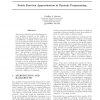Free Online Productivity Tools
i2Speak
i2Symbol
i2OCR
iTex2Img
iWeb2Print
iWeb2Shot
i2Type
iPdf2Split
iPdf2Merge
i2Bopomofo
i2Arabic
i2Style
i2Image
i2PDF
iLatex2Rtf
Sci2ools
114
click to vote
ICML
1995
IEEE
1995
IEEE
Stable Function Approximation in Dynamic Programming
The success ofreinforcement learninginpractical problems depends on the ability to combine function approximation with temporal di erence methods such as value iteration. Experiments in this area have produced mixed results; there have been both notable successes and notable disappointments. Theory has been scarce, mostly due to the difculty of reasoning about function approximators that generalize beyond the observed data. We provide a proof of convergence for a wide class of temporal di erence methods involving function approximators such as k-nearest-neighbor, and show experimentally that these methods can be useful. The proof is based on a view of function approximators as expansion or contraction mappings. In addition, we present a novel view of tted value iteration: an approximate algorithm for one environment turns out to be an exact algorithm for a di erent environment.
Di Erence Methods | ICML 1995 | Machine Learning | Methods Involving Function | Temporal Di Erence |
Related Content
| Added | 17 Nov 2009 |
| Updated | 17 Nov 2009 |
| Type | Conference |
| Year | 1995 |
| Where | ICML |
| Authors | Geoffrey J. Gordon |
Comments (0)

